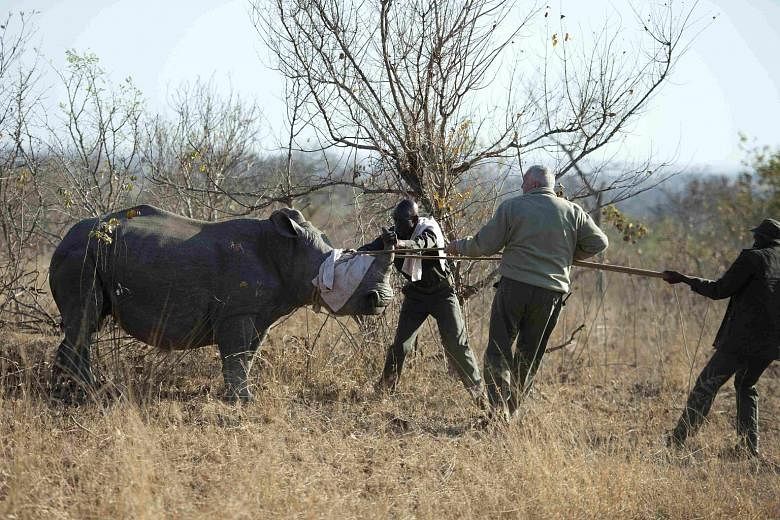KRUGER NATIONAL PARK (South Africa) • A prosecutor in South Africa's Kruger National Park says rhino-poaching cases appear in court like "shoplifting cases in the city", casting her doubt on the country's anti-poaching strategy as it suffers another year of rhino-poaching carnage.
For six years, prosecutor Ansie Venter has been working on rhino-poaching cases in Skukuza Magistrates' Court, the legal heart of the world-famous park. Yet, despite a high conviction rate, Ms Venter still sees waves of people in court in connection with poaching, a state of affairs that riles her.
South Africa is on track to another record year of rhino poaching. Last year, 1,215 rhinos were killed for their horn, used in Asia for its supposed medicinal qualities.
In the first four months of this year, 393 rhinos were killed - a more than 18 per cent increase over last year, environmental affairs minister Edna Molewa said earlier this year.
In the Skukuza court, in June, Ms Venter pushed for the imprisonment of Elliot Mzimba, a 43-year-old father of six from Mozambique arrested earlier this year in Kruger park with a .375 calibre hunting rifle and ammunition.
Mzimba pleaded guilty to all charges - trespassing, illegal possession of a firearm and ammunition, and intent to commit a crime - and was sentenced to seven years in jail.
South Africa does not have specific legislation designed to address rhino poaching. As a result, prosecutors have to push for the maximum sentences of what used to be relatively innocuous offences. But many poachers slip through legislative cracks by posting bail and escaping the country.
"Mozambique has not signed any extradition treaty, which means they flee and do not come back to court, in which case justice, obviously, is not served," said Ms Venter.
Activists decry the lack of cooperation between South Africa and Mozambique. Mr Dex Kotze, a South African organiser of the global march for elephants and rhinos, has been lobbying the government to make rhino poaching a "schedule 5 offence", the same with murder, with a 15-year jail sentence. The fact that the laws have not been amended or that an extradition treaty has not been signed points to "a lack of political will", he said. "It's disgusting."
AGENCE FRANCE-PRESSE

